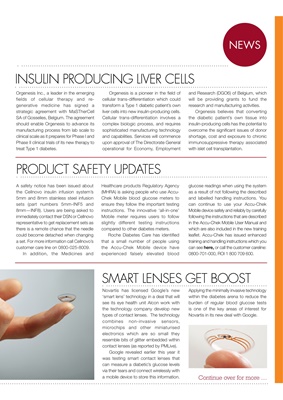
NEWS
Continue over for more ....
INSULIN PRODUCING LIVER CELLS
Orgenesis Inc., a leader in the emerging
fields of cellular therapy and regenerative medicine
has signed a
strategic agreement with MaSTherCell
SA of Gosselies, Belgium. The agreement
should enable Orgenesis to advance its
manufacturing process from lab scale to
clinical scale as it prepares for Phase I and
Phase II clinical trials of its new therapy to
treat Type 1 diabetes.
Orgenesis is a pioneer in the field of
cellular trans-differentiation which could
transform a Type 1 diabetic patient's own
liver cells into new insulin-producing cells.
Cellular trans-differentiation involves a
complex biologic process, and requires
sophisticated manufacturing technology
and capabilities. Services will commence
upon approval of The Directorate General
operational for Economy, Employment
and Research (DGO6) of Belgium, which
will be providing grants to fund the
research and manufacturing activities.
Orgenesis believes that converting
the diabetic patient's own tissue into
insulin-producing cells has the potential to
overcome the significant issues of donor
shortage, cost and exposure to chronic
immunosuppressive therapy associated
with islet cell transplantation.
Novartis has licensed Google's new
'smart lens' technology in a deal that will
see its eye health unit Alcon work with
the technology company develop new
types of contact lenses. The technology
combines non-invasive sensors,
microchips and other miniaturised
electronics which are so small they
resemble bits of glitter embedded within
contact lenses (as reported by PMLive).
Google revealed earlier this year it
was testing smart contact lenses that
can measure a diabetic's glucose levels
via their tears and connect wirelessly with
a mobile device to store this information.
SMART LENSES GET BOOST
Applying the minimally invasive technology
within the diabetes arena to reduce the
burden of regular blood glucose tests
is one of the key areas of interest for
Novartis in its new deal with Google.
The Medicines and Healthcare products
Regulatory Agency (MHRA) has recently
issued some diabetes equipment
related warnings. It is asking people with
diabetes who use Accu-Chek Mobile
blood glucose meters to ensure they
follow the important testing instructions.
This is because the meter may give false
high blood glucose readings if testing
instructions are not followed accordingly.
If not followed correctly an incorrect
reading may be given even though the
meter is working properly.
PRODUCT WARNINGS
The innovative 'all-in-one' Mobile
meter requires users to follow slightly
different testing instructions compared
to other diabetes meters. In particular,
the sensitive testing strip only needs a
small amount of blood to take a reading.
Holding your finger on the strip for too
long, or with too much blood may cause
a misreading.
Accu-Chek has issued enhanced
training and handling instructions which
you can see here or contact the customer
care line on 0800-701-000.
In addition, a field safety notice
has been issued about the Cellnovo
insulin infusion system's 5mm and 8mm
stainless steel infusion sets (part numbers
5mm-INF5 and 8mm-INF8). Users are
being asked to immediately contact their
DSN or Cellnovo representative to get
replacement sets as there is a remote
chance that the needle could become
detached when changing a set.
For more information call Cellnovo's
customer care line on 0800-025-8009.